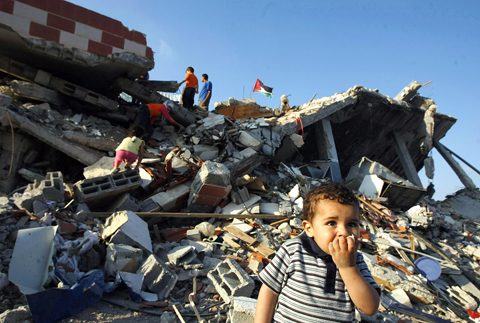Israel yesterday shrugged off a blunt US call for a halt to all Jewish settlement building on occupied Palestinian land, the latest sign Washington is hardening its tone towards its close ally.
“Normal life” will be allowed in settlements in the occupied West Bank, government spokesman Mark Regev said, using a euphemism for continuing construction to accommodate population growth.
The fate of settlements “will be determined in final status negotiations between Israel and the Palestinians and in the interim, normal life must be allowed to continue in those communities,” he said.

PHOTO: AFP
His comments marked an effective rebuff to US Secretary of State Hillary Clinton’s declaration that US President Barack Obama wants a stop to all settlement activity as he pushes for the revival of stalled peace talks.
“He wants to see a stop to settlements. Not some settlements, not outposts, not natural growth exceptions,” Clinton said.
Another senior Israeli official also played down the comments, saying Clinton “did nothing but again express the differences that appeared during the May 18 meeting in Washington between President Barack Obama and Prime Minister Benjamin Netanyahu.”
It was the clearest example yet of the rift emerging between the administration of Obama, who has vowed to vigorously pursue the peace process as part of a changed approach to the region, and Netanyahu, presiding over a hardline government largely opposed to many concessions.
Clinton’s call came ahead of Obama’s White House meeting yesterday with Palestinian President Mahmud Abbas, who has ruled out restarting peace talks with Israel unless it removes all roadblocks and freezes settlement activity.
Netanyahu has said his Cabinet would not build any new settlements, but vowed to continue building in existing blocs despite US demands to stop.
“I have no intention to construct new settlements, but it makes no sense to ask us not to answer to the needs of natural growth and to stop all construction,” he told the Cabinet on Sunday.
More than 280,000 settlers currently live in settlements dotted throughout the Palestinian territory that Israel captured during the 1967 Six Day War. The international community considers the settlements illegal.
Meanwhile, Amnesty International, in its annual report released yesterday — The State of the World’s Human Rights — accused Israel of “repeatedly” violating the laws of war during its December offensive in the Gaza Strip that killed more than 1,400 Palestinians.
“Israeli forces repeatedly breached the laws of war, including by carrying out direct attacks on civilians and civilian buildings and attacks targeting Palestinian militants that caused a disproportionate toll among civilians,” the report said.
Some 300 children were among the dead and around 5,000 people were wounded in Israel’s three-week bombardment of the coastal enclave, the report said.
The Israeli organization NGO Monitor criticized the report, saying Amnesty had ignored violations by the Palestinian Hamas movement that controls the Gaza Strip.
It also accused the international rights watchdog of failing to provide context in highlighting four cases of Palestinians who lost their lives after being denied entry into Israel for treatment.

Eleven people, including a former minister, were arrested in Serbia on Friday over a train station disaster in which 16 people died. The concrete canopy of the newly renovated station in the northern city of Novi Sad collapsed on Nov. 1, 2024 in a disaster widely blamed on corruption and poor oversight. It sparked a wave of student-led protests and led to the resignation of then-Serbian prime minister Milos Vucevic and the fall of his government. The public prosecutor’s office in Novi Sad opened an investigation into the accident and deaths. In February, the public prosecutor’s office for organized crime opened another probe into

RISING RACISM: A Japanese group called on China to assure safety in the country, while the Chinese embassy in Tokyo urged action against a ‘surge in xenophobia’ A Japanese woman living in China was attacked and injured by a man in a subway station in Suzhou, China, Japanese media said, hours after two Chinese men were seriously injured in violence in Tokyo. The attacks on Thursday raised concern about xenophobic sentiment in China and Japan that have been blamed for assaults in both countries. It was the third attack involving Japanese living in China since last year. In the two previous cases in China, Chinese authorities have insisted they were isolated incidents. Japanese broadcaster NHK did not identify the woman injured in Suzhou by name, but, citing the Japanese

YELLOW SHIRTS: Many protesters were associated with pro-royalist groups that had previously supported the ouster of Paetongtarn’s father, Thaksin, in 2006 Protesters rallied on Saturday in the Thai capital to demand the resignation of court-suspended Thai Prime Minister Paetongtarn Shinawatra and in support of the armed forces following a violent border dispute with Cambodia that killed more than three dozen people and displaced more than 260,000. Gathered at Bangkok’s Victory Monument despite soaring temperatures, many sang patriotic songs and listened to speeches denouncing Paetongtarn and her father, former Thai prime minister Thaksin Shinawatra, and voiced their backing of the country’s army, which has always retained substantial power in the Southeast Asian country. Police said there were about 2,000 protesters by mid-afternoon, although

MOGAMI-CLASS FRIGATES: The deal is a ‘big step toward elevating national security cooperation with Australia, which is our special strategic partner,’ a Japanese official said Australia is to upgrade its navy with 11 Mogami-class frigates built by Japan’s Mitsubishi Heavy Industries, Australian Minister for Defence Richard Marles said yesterday. Billed as Japan’s biggest defense export deal since World War II, Australia is to pay US$6 billion over the next 10 years to acquire the fleet of stealth frigates. Australia is in the midst of a major military restructure, bolstering its navy with long-range firepower in an effort to deter China. It is striving to expand its fleet of major warships from 11 to 26 over the next decade. “This is clearly the biggest defense-industry agreement that has ever